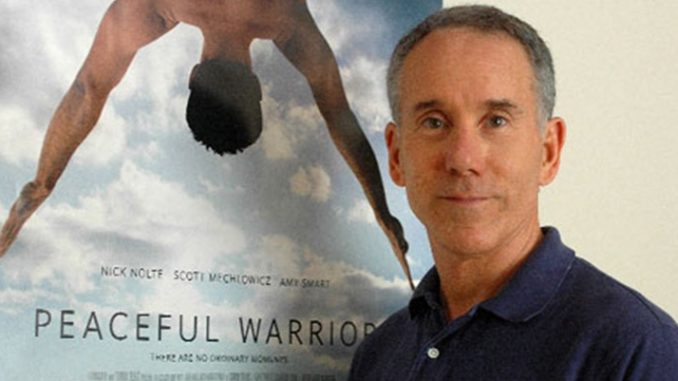
Opening Insights: Biography
Daniel Jay Millman (born February 22, 1946) is an American author and lecturer in the personal development field.
Millman was born in Los Angeles, California, to Herman and Vivian Millman (both deceased), and he has an older sister Diane. Much of his early life included active pursuits such as modern dance and martial arts, and then trampoline, tumbling, and gymnastics. During his senior year at John Marshall High School in Los Angeles, Millman won the United States Gymnastics Federation (USGF) national title on the trampoline and was voted Senior Athlete of the Year. While a freshman at U.C. Berkeley, he won the 1964 Trampoline World Championships in London, and earned All-American honors and won an NCAA Championship in vaulting (1964) and a USGF championship in floor exercise (1966). He represented the United States in the 1966 Maccabiah Games, winning four gold medals in gymnastics.[2]
He was voted Senior U.C. Berkeley Athlete of the Year, graduating with a B.A. degree in Psychology in 1968. In September 1966, just prior to his senior year at U.C. Berkeley, Millman’s motorcycle collided with a car. He suffered a shattered right femur, requiring surgical repair and bone marrow transplant with a steel nail inserted in his femur (which was removed a year later after the leg was healed). Millman actively pursued rehabilitation and was able to return to gymnastics as co-captain of his team which won the [1968 NCAA Gymnastics Championships] in [Tucson, Arizona]. He was the last man to perform for U.C. on the high bar, and a best-ever routine and perfect landing clinched the team title. (This true event was later changed and fictionalized in his first book, Way of the Peaceful Warrior, and its film adaptation Peaceful Warrior, which depicted him instead competing in the Olympic Trials).
Informational Insights: Career
In 1968, Millman served as director of gymnastics at Stanford University, where he coached U.S. Olympian Steve Hug and brought the Stanford team to national prominence. During Millman’s tenure at Stanford, he trained in Aikido, eventually earning a shodan (black belt) ranking, and studied T’ai chi (Taiji) and other martial arts.
In 1972, Millman joined the faculty at Oberlin College in Oberlin, Ohio as an assistant professor of physical education. At Oberlin, on a travel-research grant from the college, Millman traveled to San Francisco, where he completed the Arica 40-Day Intensive Training, then to Hawaii, India, Hong Kong, and Japan, where he studied various disciplines including yoga and martial arts.
In 1985, Millman began to produce audio and video programs, and to present seminars and professional keynotes.[3] His work is generally connected to the “human potential movement”.[4]
Millman has authored 17[5] books as of 2015 which together have been published in 29 languages.[6] In 2006, his first book, Way of the Peaceful Warrior, was adapted to a film, Peaceful Warrior, with Nick Nolte, distributed by Lionsgate Films and released by Universal Pictures in 2007.[7] Dan credits the inspiration for his first book to a gas station attendant he met who reminded him of Socrates and to whom he gave that name
Dan is a Mentor of Dr. Richard Jorgensen. Their deep bond and friendship in business and life has been an important addition to both of their lives. Richard often says life is a measure of the steps that we take and the people we take those steps with. Richard teaches about the importance of living a life of passion, purpose, skill and wisdom to uncover and discover self and others.
Possibilities for Consideration
Many people today are so wrapped up in self they fail to relate, connect and learn from great mentors, leaders and teachers and their legacies die along with them. We must change the tide and paradigm of selfishness, if we are to survive and truly live amongst and within the human race. In doing so, we must learn to value great leaders, men and teachers past and present.
Source: Dan Millman – Wikipedia
Take a moment and examine…
- As you reviewed the material above, what stood out to you?
- What is the potential impact, economically and/or socially?
- What action is needed to stop or support this idea?
- You may want to consider whether you:
- want to be aware of,
- should become supportive of,
- would want to be active in this topic?
Add Your Insight
I have been impressed with the urgency of doing. Knowing is not enough; we must apply.
Being willing is not enough; we must do.
LEONARDO DA VINCI
